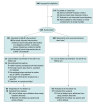Adapted Mindfulness Training for Interoception and Adherence to the DASH Diet: A Phase 2 Randomized Clinical Trial
- PMID: 37917063
- PMCID: PMC10623198
- DOI: 10.1001/jamanetworkopen.2023.39243
Adapted Mindfulness Training for Interoception and Adherence to the DASH Diet: A Phase 2 Randomized Clinical Trial
Abstract
Importance: Hypertension is a major cause of cardiovascular disease, and although the Dietary Approaches to Stop Hypertension (DASH) diet lowers blood pressure (BP), adherence is typically low. Mindfulness training adapted to improving health behaviors that lower BP could improve DASH adherence, in part through improved interoceptive awareness relevant to dietary consumption.
Objective: To evaluate the effects of the Mindfulness-Based Blood Pressure Reduction (MB-BP) program on interoceptive awareness and DASH adherence.
Design, setting, and participants: Parallel-group, phase 2, sequentially preregistered randomized clinical trials were conducted from June 1, 2017, to November 30, 2020. Follow-up was 6 months. Participants with elevated unattended office BP (≥120/80 mm Hg) were recruited from the population near Providence, Rhode Island. Of 348 participants assessed for eligibility, 67 did not meet inclusion criteria, 17 declined, and 63 did not enroll prior to study end date. In total, 201 participants were randomly assigned, 101 to the MB-BP program and 100 to the enhanced usual care control group, with 24 (11.9%) unavailable for follow-up. Outcome assessors and the data analyst were blinded to group allocation. Analyses were performed using intention-to-treat principles from June 1, 2022, to August 30, 2023.
Interventions: The 8-week MB-BP program was adapted for elevated BP, including personalized feedback, education, and mindfulness training directed to hypertension risk factors. Both MB-BP and control groups received home BP monitoring devices with instructions and options for referral to primary care physicians. The control group also received educational brochures on controlling high BP.
Main outcomes and measures: The primary outcome was Multidimensional Assessment of Interoceptive Awareness (MAIA) questionnaire scores (range 0-5, with higher scores indicating greater interoceptive awareness), and the secondary outcome was DASH adherence scores assessed via a 163-item Food Frequency Questionnaire (range 0-11, with higher scores indicating improved DASH adherence), all compared using regression analyses.
Results: Among 201 participants, 118 (58.7%) were female, 163 (81.1%) were non-Hispanic White, and the mean (SD) age was 60.0 (12.2) years. The MB-BP program increased the MAIA score by 0.54 points (95% CI, 0.35-0.74 points; P < .001; Cohen d = 0.45) at 6 months vs control. In participants with poor baseline DASH adherence, the MB-BP program also significantly increased the DASH score by 0.62 points (95% CI, 0.13-1.11 points; P = .01; Cohen d = 0.71) at 6 months vs controls. The intervention was also associated with a 0.34-point improvement in the DASH diet score in all MB-BP participants from baseline (95% CI, 0.09-0.59 points; P = .01; Cohen d = 0.27), while the control group showed a -0.04 point change in DASH diet score from baseline to 6 months (95% CI, -0.31 to 0.24 points; P = .78; Cohen d = -0.03).
Conclusions and relevance: A mindfulness program adapted to improving health behaviors to lower BP improved interoceptive awareness and DASH adherence. The MB-BP program could support DASH dietary adherence in adults with elevated BP.
Clinical trial registration: ClinicalTrials.gov Identifiers: NCT03859076 and NCT03256890.
Conflict of interest statement
Figures



References
-
- Yusuf S, Joseph P, Rangarajan S, et al. Modifiable risk factors, cardiovascular disease, and mortality in 155 722 individuals from 21 high-income, middle-income, and low-income countries (PURE): a prospective cohort study. Lancet. 2020;395(10226):795-808. doi: 10.1016/S0140-6736(19)32008-2 - DOI - PMC - PubMed
-
- Morze J, Danielewicz A, Hoffmann G, Schwingshackl L. Diet quality as assessed by the healthy eating index, alternate healthy eating index, dietary approaches to stop hypertension score, and health outcomes: a second update of a systematic review and meta-analysis of cohort studies. J Acad Nutr Diet. 2020;120(12):1998-2031.e15. doi: 10.1016/j.jand.2020.08.076 - DOI - PubMed
Publication types
MeSH terms
Associated data
Grants and funding
LinkOut - more resources
Full Text Sources
Medical
Miscellaneous

